- From the sectionAfrica
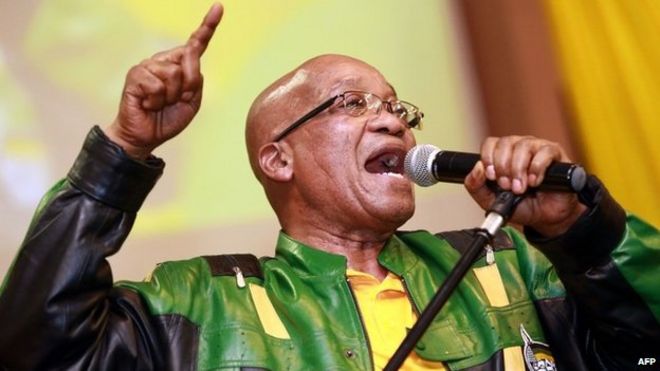
Jacob Zuma is the most colourful and controversial president South Africa has had since white-minority rule ended in 1994.
He was born into poverty, went into exile to fight apartheid and has been embroiled in a series of scandals, which would have ended the careers of many politicians.
His poor roots, charisma and strength in adversity partly explain his ability to hold on to power, despite calls for his resignation and attempts to oust him as ANC leader.
His credibility was most severely damaged in March when an independent inquiry, led by South Africa’s Public Protector Thuli Madonsela, found the government had improperly spent money on upgrading his private residence, including building a cattle enclosure, amphitheatre and swimming pool, at a cost of about $23m (£13.8m).
Mr Zuma’s private life has also grabbed the headlines, and has caused much controversy.
The 72-year-old is a proud polygamist – following a Zulu tradition – and currently has four wives. He is also known for his infidelity and has fathered a child with another woman.
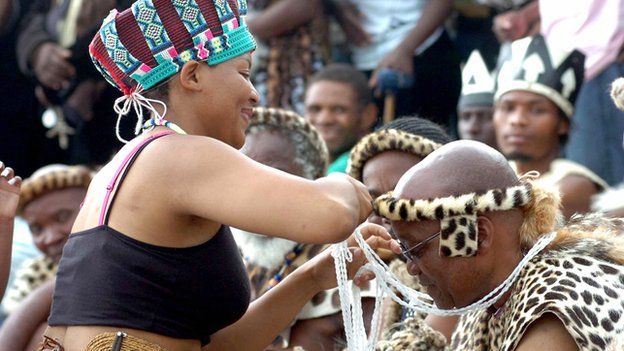
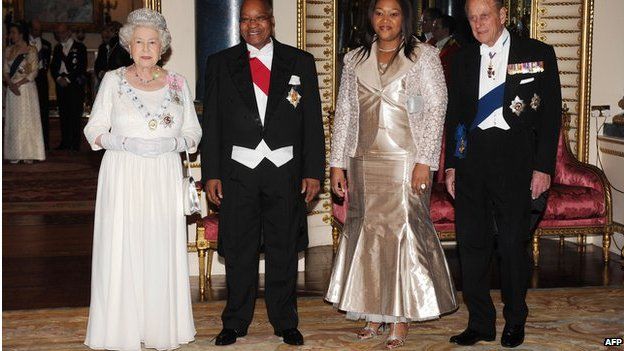
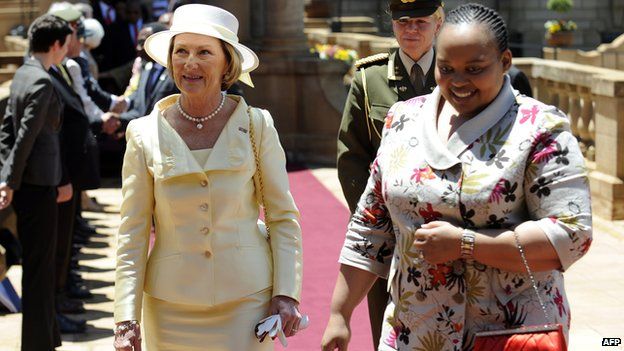
This drew scorn from his critics and in 2012, a painting showing him with his genitals hanging out was displayed at an art gallery in Johannesburg.
There was an outcry from his supporters, with the ANC condemning it as a violation of the president’s dignity, and it was removed.
His political career was written off in the run-up to the 2009 election when he was simultaneously battling allegations of rape and corruption.
He was acquitted of rape, though the corruption case proved harder to shake off.
He always denied charges of money-laundering and racketeering, stemming from a controversial $5bn arms deal signed in 1999 and had said he would resign if found guilty of wrong-doing.
His supporters always said the accusations were politically motivated and the charges were thrown out just weeks before the elections which saw him become president.
At the time, Mr Zuma’s supporters saw his charismatic popular touch as a refreshing contrast to Thabo Mbeki, who was seen as a rather aloof president.
“He is a man who listens; he doesn’t take the approach of an intellectual king,” said one unnamed supporter, in an apparent swipe at Mr Mbeki, whose allies were accused of interfering in Mr Zuma’s prosecution after he had wrested control of the ANC in 2007 in a bitter struggle
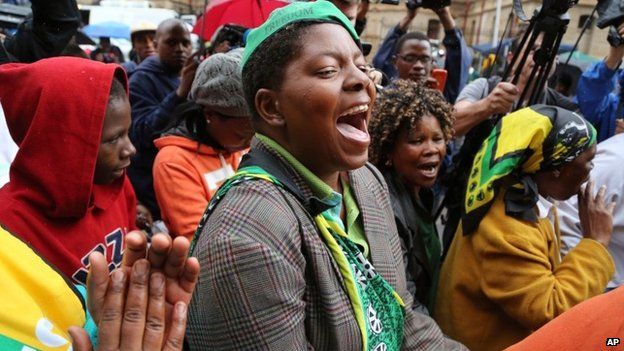
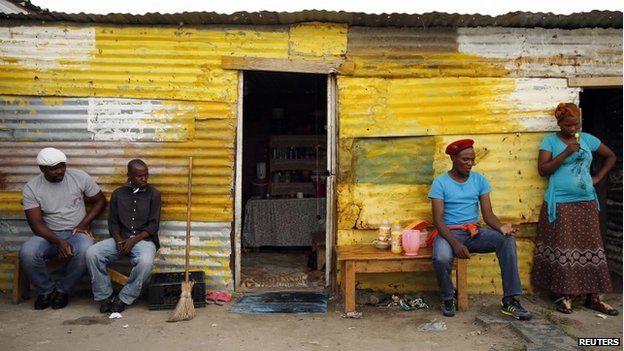
Mr Zuma’s modest upbringing and promotion of traditional family values are seen as a major factor in his enduring popularity among many poor South Africans, especially in rural areas.
Good dancer
His rise to power earned him the name “the people’s president”, but this carefully crafted image lay in tatters following the controversy over the upgrading of his residence in the rural area of Nkandla in northern KwaZulu-Natal.
ANC supporters heckled and booed him in front of foreign dignitaries – including US President Barack Obama – at a memorial in Johannesburg following the death of South Africa’s first black leader, Nelson Mandela, in December 2013.
“He is eating when we are hungry,” one protester said, capturing the public anger over the Nkandla upgrade.
Nkandla was where he was born in 1942. Brought up by his widowed mother, he had no formal schooling.
He joined the ANC at the age of 17, becoming an active member of its military wing, Umkhonto We Sizwe, in 1962.
He was convicted of conspiring to overthrow the apartheid government and imprisoned for 10 years on the notorious Robben Island, alongside Mr Mandela.
Mr Zuma, popularly known as “JZ”, is said to have helped keep up morale among the incarcerated ANC grandees with songs and impromptu theatre – it was that comical nature which endeared him to ordinary South Africans before his elevation to the presidency.
After being freed from prison, Mr Zuma left South Africa, living first in Mozambique, then Zambia, as he rose through the ANC ranks to the executive committee.
He became one of the first leaders to return home in 1990 – when the ban on the ANC was removed – to take part in negotiations with the white-minority government.
While trying to oust Mr Mbeki, he enjoyed strong support among trade unionists and the communist party – an ANC ally – as they believed he would redistribute South Africa’s wealth in favour of the poor.
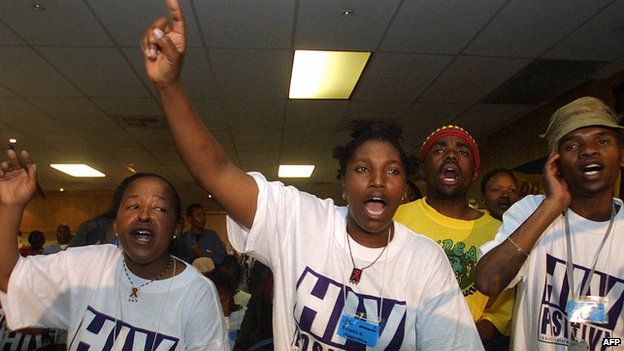
They said Mr Mbeki was too business-friendly and had presided over “jobless growth”.
‘Grinding his enemies’
However, Mr Zuma has not changed South Africa’s economic policy and some of his erstwhile allies, such as firebrand youth leader Julius Malema, have since dropped him, accusing him of not doing enough to help the poor.
His private life has not helped this impression.
Married six times in total, Mr Zuma has 21 children and has married twice since becoming president in lavish traditional ceremonies in Nkandla.
One of his wives committed suicide in 2000 and his ex-wife, Nkosazana Dlamini-Zuma, is now chairperson of the African Union commission.
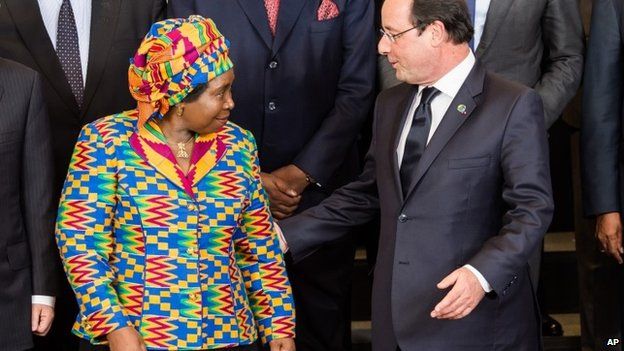
The president’s attitude to HIV has also come in for criticism.
In 2006, he was acquitted of raping an HIV-positive family friend, but his statement during the trial, that he showered after unprotected sex with the woman to guard against possible infection, provoked ridicule.
Four years later, he admitted that he had had a baby with the daughter of another family friend.
He was again accused of undermining the government’s HIV/Aids policy, which urges people to be faithful and use condoms.
But as president he won over many critics and activists when he announced a major overhaul to the country’s Aids policy in December 2010 – this has seen a drastic increase of the roll-out of life-saving anti-retroviral (ARV) drugs.
Mr Mbeki had denied the link between HIV and Aids and his government had always said ARV drugs were too expensive to distribute to all who needed them.
But that has been one of Mr Zuma’s few unqualified successes.
The economy remains in the doldrums, the ANC is accused of only looking after its own and there are almost daily protests by people demanding better basic services such as housing, schools, water and electricity.
At the ANC’s elective conference in December 2012, Mr Zuma staved off a challenge from his deputy, Kgalema Motlanthe, for the leadership of the party.
He is now spearheading the ANC’s election campaign, and victory will guarantee him a second term in office.
His ability to hold on to the presidency shows that it is unwise to write off the man whose Zulu name, Gedleyihlekisa, means one who smiles while grinding his enemies.


